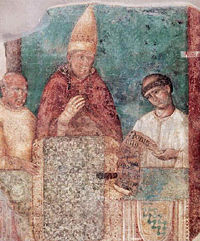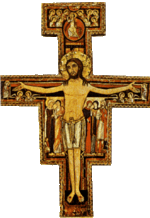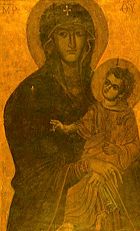Pope Boniface VIII
| Boniface VIII | |
 |
|
| Papacy began | December 24, 1294 |
|---|---|
| Papacy ended | October 11, 1303 |
| Predecessor | Celestine V |
| Successor | Benedict XI |
| Birth name | Benedetto Caetani |
| Born | c. 1235 Anagni, Italy |
| Died | October 11, 1303 Rome, Italy |
| Other popes named Boniface | |
Pope Boniface VIII (c. 1235 – October 11, 1303), born Benedetto Caetani, was Pope of the Roman Catholic Church from 1294 to 1303.
Contents |
Biography
Caetani was born in 1235 in Anagni, c. 50 kilometers southeast of Rome. He was the younger son of a minor noble family, the Caetani Family, and became a canon of the cathedral in Anagni in his teens. In 1252, when his uncle Peter Caetani became bishop of Todi, in Umbria, Benedetto went with him and began his legal studies there. Benedetto never forgot his roots in Todi, later describing the city as "the dwelling place of his early youth," the city which "nourished him while still of tender years," and as a place where he "held lasting memories". In 1260, Benedetto acquired a canonry in Todi, as well as the small nearby castle of Sismano. Later in life he repeatedly expressed his gratitude to Anagni, Todi, and his family.
In 1264, Benedetto became part of the Roman Curia where he served as secretary to Cardinal Simon of Brie on a mission to France. Similarly, he accompanied Cardinal Ottobono Fieschi to England (1265-1268) in order to suppress a rebellion by a group of barons against Henry III, a churchman in England. Upon Benedetto's return from England, there is an eight year period in which nothing is known about what occurred in his life. After this eight year period of uncertainty, Benedetto was sent to France to supervise the collection of a tithe in 1276 and then became a papal notary in the late 1270s. During this time, Benedetto accumulated seventeen benefices which he was permitted to keep when he was promoted, first to cardinal deacon in 1281 and then 10 years later as cardinal priest. As cardinal, he often served as papal legate in diplomatic negotiations with France, Naples, Sicily, and Aragon.
He was elected in December 24, 1294 after Pope Celestine V abdicated in December 13. There is a legend that it was Boniface VIII's doing that Celestine V renounced the papacy - for Boniface, previously Benedetto, convinced Celestine V that no person on the earth could go through life without sin. However, in later times, it is a more common understanding that Celestine V resigned by his own designs and Benedetto merely showed that it was allowed by Church law. Either way, Celestine V left and Boniface VIII took his place as pope. One of his first acts as pontiff was to imprison his predecessor in the Castle of Fumone in Ferentino, where he died at the age of 81, attended by two monks of his order. In 1300, Boniface VIII formalized the jubilees, which afterwards became a source of both profit and scandal to the church. Boniface VIII founded the University of Rome La Sapienza in 1303.
Boniface VIII put forward some of the strongest claims to temporal, as well as spiritual, supremacy of any Pope and constantly involved himself with foreign affairs. In his Bull of 1302, Unam Sanctam, Boniface VIII proclaimed that it "is absolutely necessary for salvation that every human creature be subject to the Roman pontiff", pushing papal supremacy to its historical extreme. These views and his intervention in "temporal" affairs led to many bitter quarrels with the Emperor Albert I of Habsburg (1291-1298), the powerful family of the Colonnas, with Philip IV of France (1285–1314) and with Dante Alighieri (who wrote De Monarchia to argue against it).
Conflicts with Philip IV
The conflict between Boniface VIII and Philip IV of France came at a time of expanding nation states and the desire for the consolidation of power by the increasingly powerful monarchs. The increase in monarchical power in the rising nation states and its conflicts with the Church of Rome were only exacerbated by the rise to power of Phillip IV. In France, the process of centralizing royal power and developing a genuine national state began with the Capetian kings. During his reign, Phillip surrounded himself with the best civil lawyers, and decidedly expelled the clergy from all participation in the administration of the law. With the clergy beginning to be taxed in Theri and England in order to finance their ongoing wars against each other, Boniface took a hard stand against it. He saw the taxation as an assault on traditional clerical rights, and ordered the Bull Clericis laicos in February 1296, forbidding lay taxation of the clergy without prior papal approval. In the bull, Boniface states "they exact and demand from the same the half, tithe, or twentieth, or any other portion or proportion of their revenues or goods; and in many ways they try to bring them into slavery, and subject them to their authority. And also whatsoever emperors, kings, or princes, dukes, earls or barons...presume to take possession of things anywhere deposited in holy buildings...should incur sentence of excommunication." It was during the issuing of Clericis Laicos that hostilities between Boniface and Philip began. Philip retaliated against the bull by denying the exportation of money from France to Rome, funds that the Church required to operate. Boniface had no choice but to quickly meet the demands of Philip by allowing taxation only "during an emergency."
After complications involving the capture of Bernard Saisset by Philip, the conflict was re-ignited. In December of 1301, Philip was sent the Papal Bull Ausculta fili ("Listen, My Son"), informing Philip that "God has set popes over kings and kingdoms."
The feud between the two reached its peak in the early 14th century when Philip began to launch a strong anti-papal campaign against Boniface. On November 18, 1302, Boniface issued one of the most important papal bulls of Catholic History: Unam Sanctum. It declared that both spiritual and temporal power were under the pope's jurisdiction, and that kings were subordinate to the power of the Church.
In response, Guillaume de Nogaret, Philip's chief minister, denounced Boniface as a heretical criminal to the French clergy. In 1303, Philip and Nogaret were excommunicated. However, on September 7, 1303 an army led by Nogaret and Sciarra Colonna of the Colonna family surprised Boniface at his retreat in Anagni. The King and the Colonnas demanded that he resign, to which Boniface VIII responded that he would "sooner die". Boniface was beaten badly and nearly executed but was released from captivity after three days. He died a month later, on October 11, 1303.
Boniface VIII was buried in St. Peter's Basilica in a grandiose tomb that he had designed himself. (Allegedly, when the tomb cracked open three centuries after his death (on October 9, 1605), his body was revealed to be perfectly incorrupt.)
Posthumous trial
A process (judicial investigation) against the memory of Boniface was held from 1303 to 1311[1]. The collected testimonies (especially those of the examination held at Groseau in August and September of 1310) alleged many heretical opinions of Boniface VIII. This included the offence of sodomy, although there is little substantive evidence for this and it's more likely that this was the standard accusation Philip made against enemies[2].
The trial was settled without a result in 1311.
Boniface VIII and culture
- In his Inferno, Dante portrayed Boniface VIII as destined for hell, where simony is punished, although Boniface was still alive at the fictional date of the poem's story. Boniface's eventual destiny is revealed to Dante by Pope Nicholas III, whom he meets. A bit later in the Inferno, we are reminded of the pontiff's feud with the Colonnesi, which led him to demolish the city of Palestrina, killing 6,000 citizens and destroying both the home of Julius Caesar and a shrine to the Blessed Virgin Mary. Boniface's ultimate fate is confirmed by Beatrice when Dante visits Heaven.
- The great mathematician and astronomer Giovanni Campano served as personal physician to Pope Boniface VIII.
- In Boccaccio's Decameron, Boniface VIII is satirically depicted granting a highwayman (Ghino di Tacco) a priorate (Day 10, second tale). Earlier (I.i), Boniface VIII is also mentioned for his role in sending Charles of Valois to Florence in 1300 to end the feud between the Black and White Guelphs.
- Boniface was a patron of Giotto di Bondone.
- Boniface had restored the churches of Rome for the Great Jubilee of 1300, particularly St. Peter's Basilica, the Basilica of St. John Lateran, and the Saint Mary Major Basilica.
References
- Boase, Thomas S. R. (1933). Boniface VIII. London: Constable.
- Coppa, Frank J, ed. (2002). The Great Popes Through History. Connecticut. Greenwood Press.
- Jean Coste (ed.), ed. (1995). Boniface VIII en procès. Articles d'accusation et dépositions des témoins (1303–1311). Rome: L'Erma di Bretschneider. ISBN 88-7062-914-7.
- Tierney, Brian (1964). Crisis of Church and State. New Jersey: Prentice-Hall.
- Wood, Charles, T. (1967). Phillip the Fair and Boniface VIII: State vs Papacy. New York: Holt, Rhinehart, and Winston.
External links
- Catholic Encyclopedia: "Pope Boniface VIII"
- Catholic Encyclopedia: "Pope Clement V: a paragraph on the trial of Boniface VIII
- Register of Boniface VIII: The Indiction of the Holy Year 1300 (Vatican Secret Archives)
- The 1303 document founding the University of Rome La Sapienza (Vatican Secret Archives)
- The 1303 document joining several schools into the University of Avignon (Vatican Secret Archives)
- The Bull Clericis Laicos (Medieval Sourcebook)
- Biographisch-Bibliographisches Kirchenlexikon" "Bonifatius VIII"
- "Boniface VIII against the Revolution" (Saint Benedict Center)
- "Boniface VIII and the Heresy of Statism" (Saint Benedict Center)
| Roman Catholic Church titles | ||
|---|---|---|
| Preceded by Celestine V |
Pope 1294–1303 |
Succeeded by Benedict XI |
|
||||||||||||||||
|
|||||||||||||||||||||||||||||||||||||||||||||
|
|||||||||||||||||||||||||||||||||||||||||||||

